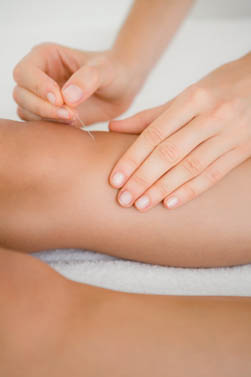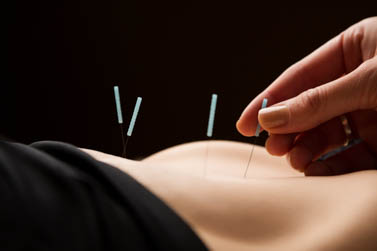Acupuncture and moxibustion relieve irritable bowel syndrome (IBS), a disorder of the large intestine often involving abdominal pain, cramping, diarrhea, constipation, bloating, and gas. Researchers from the Shandong University of Traditional Chinese Medicine conducted a randomized study of patients with IBS using acupuncture and moxibustion as treatment modalities.  Patients receiving both acupuncture and moxibustion had a total effective rate of 93.3%.
Patients receiving both acupuncture and moxibustion had a total effective rate of 93.3%.
The study made a comparison of acupuncture plus moxibustion with acupuncture as a standalone procedure and a drug group. All three approaches were applied in three randomized groups of patients with IBS-D, a type of IBS involving diarrhea. The drug group received oral pinaverium bromide, 50 mg, three times per day. Pinaverium bromide is a spasmolytic medication used for the treatment of gastrointestinal disorders including IBS that acts as a calcium channel blocker. Known side effects of the drug include stomach pain, nausea, constipation, diarrhea, dizziness, skin rash, headaches, heartburn, and dry mouth.
Acupuncture plus moxibustion outperformed the other treatment regimens. Acupuncture plus moxibustion achieved a 93.3% total effective rate. Acupuncture as a standalone therapy achieved an 87.9% total effective rate. Pinaverium bromide achieved an 82.1% total effective rate. Acupuncture as a standalone therapy and acupuncture plus moxibustion outperformed the medication group in several areas including superior positive patient outcomes for reductions in stomach bloating and pain, diarrhea, and mucus in the stool.
The acupuncture procedure incorporated the following acupuncture points:
- DU20, Baihui
- CV12, Zhongwan
- ST25, Tianshu
- ST36, Zusanli
- SP9, Yinlingquan
- ST39, Xiajuxu
- LV3, Taichong
Acupuncture was applied once per day for four weeks. Total needle retention time was thirty minutes per acupuncture session. DU20 was needled transversely and posteriorly to a depth of 0.5 to 0.8 inches. LV3 was needled to the same depth and angled perpendicularly-obliquely towards KD1 (Yongquan). Acupoints CV12, ST25, ST36, SP9, and ST39 were needled perpendicularly to a depth of 0.8 to 1.3 inches.
Moxibustion was applied using ginger partitioned moxa over acupoints ST25 and CV4 (Guanyuan). Freshly cut ginger (Sheng Jiang) was cut to a thickness of 0.5 cm. The middle part of the ginger was pricked several times with an acupuncture needle. A layer of dry cotton was placed on the skin at the acupuncture point and the ginger was placed on top. The moxa was placed on top of the ginger. The results demonstrate that moxibustion enhances the total efficacy rate of acupuncture for the treatment of IBS. 
Zhang et al. had similar findings. In a meta-analysis of 11 studies, with a sample size of over 950 patients, the researchers conclude that acupuncture with moxibustion produces better patient outcomes than drug therapy. The researchers conclude, “Acupuncture-moxibustion for irritable bowel syndrome is better than the conventional western medication treatment.”
Chao et al. find acupuncture effective for the treatment of IBS in their meta-analysis published in the World Journal of Gastroenterology. The researchers conclude, “Acupuncture exhibits clinically and statistically significant control of IBS symptoms.” The researchers sorted for “randomization, concealment of allocation, double blinding, and dropouts.” The researchers noted “our meta-analysis of six randomized controlled trials suggests that acupuncture improves the symptoms of IBS, including abdominal pain and distension, sensation of incomplete defecation, times of defecation per day, and state of stool.” Citing possible mechanisms of acupuncture’s therapeutic actions, the researchers note that one study “showed that improvement in pain in IBS was positively associated with increased parasympathetic tone in the acupuncture group.”
Published in the Journal of the American Medical Association, Bensoussan et al. add that Chinese herbal medicine is effective for the treatment of IBS. The researchers consisted of gastroenterologists and herbalists working together in a randomized, double blinded, placebo controlled trial. They note that Chinese herbal medicine “offer(s) improvements in symptoms for some patients with IBS.”
References:
Kong, S. P., Wang, W. Q., Xiao, N. & Tan, Q. W. (2014). Clinical Research of Acupuncture plus Ginger-partitioned Moxibustion for Diarrhea-predominant Irritable Bowel Syndrome. Shanghai Journal of Acupuncture and Moxibustion. 33 (10).
Patrick DL, Drossman DA, Frederick IO, et al. Quality of life in persons with irritable bowel syndrome: development and validation of a new measure[J]. Dig Dis Sci, 1998,43(2):400-411.
Usai, P. Manca, R. Lai, MA, et al. (2010). Prevalence of Irritable Bowel Syndrome in Italian Rural and Urban Areas. Eur J Intern Med. 21 (4).
Zhongguo Zhen Jiu. 2012 Oct;32(10):957-60. [Meta analysis of acupuncture-moxibustion in treatment of irritable bowel syndrome]. Pei LX, Zhang XC, Sun JH, Geng H, Wu XL. Acupuncture and Rehabilitation Department, Jiangsu Province Hospital of TCM, Nanjing, China.
JAMA. 1998 Nov 11;280(18):1585-9. Treatment of irritable bowel syndrome with Chinese herbal medicine: a randomized controlled trial. Bensoussan A, Talley NJ, Hing M, Menzies R, Guo A, Ngu M. Research Unit for Complementary Medicine, University of Western Sydney Macarthur, Campbelltown, New South Wales, Australia.
Chao, Guan-Qun, and Shuo Zhang. "Effectiveness of acupuncture to treat irritable bowel syndrome: A meta-analysis." World J Gastroenterol 20, no. 7 (2014): 1871-1877.
MacPherson H, Tilbrook H, Bland JM, Bloor K, Brabyn S, Cox H, Kang’ombe AR, Man MS, Stuardi T, Torgerson D, Watt I, Whorwell P. Acupuncture for irritable bowel syndrome: primary care based pragmatic randomised controlled trial. BMC Gastroenterol 2012; 12: 150 [PMID: 23095376 DOI: 10.1186/1471-230X-12-150].

